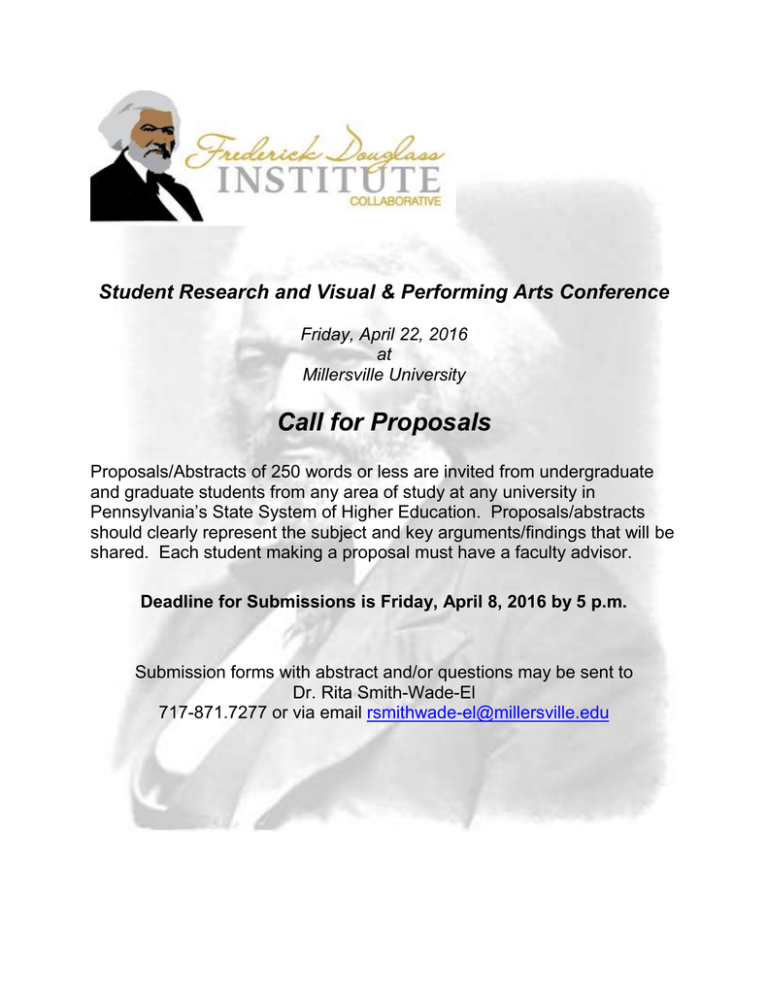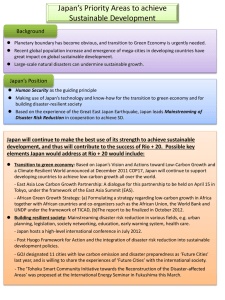Call for Proposals
advertisement

Student Research and Visual & Performing Arts Conference Friday, April 22, 2016 at Millersville University Call for Proposals Proposals/Abstracts of 250 words or less are invited from undergraduate and graduate students from any area of study at any university in Pennsylvania’s State System of Higher Education. Proposals/abstracts should clearly represent the subject and key arguments/findings that will be shared. Each student making a proposal must have a faculty advisor. Deadline for Submissions is Friday, April 8, 2016 by 5 p.m. Submission forms with abstract and/or questions may be sent to Dr. Rita Smith-Wade-El 717-871.7277 or via email rsmithwade-el@millersville.edu STUDENT RESEARCH CONFERENCE SUBMISSION FORM DUE: Friday, April 8, 2016 by 5:00 p.m. Presenter: __________________________________________________ Local Phone # _______________________________________________ Major: _______________ Graduate ____ or Undergraduate ____ Proposal Title: __________________________________________________ Campus Address: _______________________________________________ E-mail Address: _________________________________________________ Faculty Sponsor:________________________________________________ Sponsor’s Campus Address:_______________________________________ Sponsor’s Phone Extension:_______________________________________ Preferred Submission Category (please check appropriate category): ___ Paper Session ___ Creative Works Presentation ___ Works of Visual Art ___ Poetic-Dramatic Presentation ___ Musical Presentation ___ Innovative Pedagogical Method___Poster___Other(please specify):______. Special Equipment Needed (please check all that apply)*: _____VCR and TV monitor _____ Document camera (suitable for transparencies, regular paper, and photographs if available) _____ Computer projector & screen _____ Overhead projector (for transparencies and screen) _____ Other, please specify: ________________________________________________ *Note: We cannot supply a computer or laptop. You should be prepared to transport a laptop to the conference). RETURN ONE ELECTRONIC COPY OF THIS FORM AND A PROPOSAL/ABSTRACT TO: Dr. Rita Smith-Wade-El at rsmithwade-el@millersville.edu Abstracts are to be word-processed and should not be longer than 250 words. Paper copies will not be accepted. See below for examples of standard abstract formats to be used in the program booklet. SUBSCRIPTION TO DISASTER MYTHOLOGY DOES NOT VARY BY DISASTER EXPERIENCE Harry James (Sociology) Faculty Advisor: Dr. JohnLisa Smith (Anthropology) Emergency managers from a Midwestern state completed a mail questionnaire (N = 55) which sought to determine the extent to which belief in the disaster mythology varied with disaster experience. A multiple regression model was developed which suggested that disaster experience (five separate experience variables) was not a good predictor of disaster mythology subscription. The findings support the literature that disaster experience is a poor linear predictor. YOU ARE WHAT YOU SPEAK: PERCEPTIONS OF AFRICAN AMERICAN VERNACULAR ENGLISH Khansau Amadu/ Kelli Clarkson (English/ African American Studies, Communication/African American Studies) Faculty Advisor: Rita Smith-Wade-El (Psychology/African American Studies) People are often stereotyped by how they speak. People who speak what is considered Standard English are often viewed as more intelligent, of higher social status, and in possession of many other positive traits. Non-standard vernaculars are viewed as reflecting lower intelligence and status. This is especially true of African American Vernacular English (AAVE). Sixty-one Millersville University students: 28 African American and 33 Caucasian students of both genders, spanning across various majors, and class rankings listened to one of two tapes of a male speaking in either AAVE or in Standard English (SE) in a formal setting in order to; determine the perceptions of individuals who spoke AAVE as compared to those who spoke SE. Participants rated the speakers using a the Revised Speech Dialect Attitudinal Scale (SDAS). It was hypothesized that both African Americans and Caucasians would rate the speaker of AAVE more negatively than the speaker of SE, and that Caucasian participants would rate the AAVE speaker significantly lower than African American participants. The hypotheses were partially confirmed. Final findings showed that both African American and Caucasian participants rated the non-standard speaker more negatively; however there were not any racial differences. Results are discussed in terms of the prevalence of the view; race notwithstanding that one needs to speak Standard English in professional settings. ALVA: A COLLECTION OF POETRY Kelly M Sylvester (English) Faculty Advisor: Prof. Carla Rineer (English) “Alva: A Collection of Poetry” is a volume of 47 original poems that appears within the creative thesis project, “Learning Content through Writing Poetry” which is an experiential exploration of the writing to learn premise. After embarking on in depth research of Alva Smith Vanderbilt Belmont, this collection of poetry was created. Poems are written from various perspectives and voices, including “Alva,” “William Kissam,” “Consuelo,” “Mrs. William B Astor,” “Sara Bard Field,” found poems from New York Times articles and more. This presentation includes a brief introduction of Alva Smith Vanderbilt Belmont, to provide context of the poems, and then a reading of selected poems from “Alva: A Collection of Poetry.” YOU GOT YOUR CODE IN MY DESIGN Brianna Piccari & Adam Bitner (Art & Design) Faculty Advisor: Professor Nancy Mata (Art & Design) Given the opportunity to work with students of other disciplines, the Software Productization Center gave us an unparallelled experience the classroom could never provide. By interacting and working with one another, we gained a greater understanding of real world collaboration to bring software and design to the global market, as well as the hard work and dedication it takes to work in the start up business industry. Left brain and right brain processes began as a barrier separating the graphic design and computer science students, which was quickly overcome to combine visually appealing design and excellent functionality. By combining the two teams from the beginning, spontaneous interactions and workflow became one of the most beneficial learning experiences. Teamwork gave the chance for a new perspective to be experienced by each member, challenging the way they thought about their field previously.





